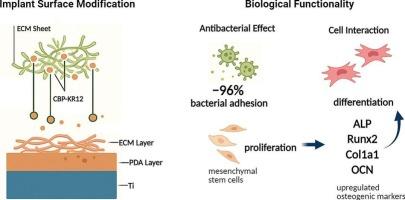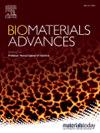KR12肽修饰的ECM涂层增强钛表面的成骨和抗菌活性。
IF 6
2区 医学
Q2 MATERIALS SCIENCE, BIOMATERIALS
Materials Science & Engineering C-Materials for Biological Applications
Pub Date : 2025-09-22
DOI:10.1016/j.bioadv.2025.214515
引用次数: 0
摘要
钛基生物材料广泛应用于骨科和牙科种植体;然而,由于骨融合不良和种植体相关感染,其临床成功仍然有限。在这项研究中,通过胶原结合肽(CBP)将抗菌肽KR12固定在来自细胞片工程的脱细胞细胞外基质(ECM)涂层上,开发了一种功能性表面修饰策略。ECM是通过温和的脱细胞过程获得的,保留了其天然结构和基本成分,包括胶原蛋白和纤维连接蛋白。KR12通过CBP成功锚定在ECM表面,在不破坏ECM结构的情况下确保了抗菌活性。使用SEM, AFM和XPS进行表面表征,证实了ECM沉积和KR12固定相关的形态和化学修饰。抗菌实验表明,虽然ECM单独没有抗菌作用,但KR12的加入显著降低了金黄色葡萄球菌的粘附,最高可达96%。细胞研究显示,ECM涂层表面的粘附和增殖增强,成骨实验证实,kr12功能化的ECM涂层促进了早期分化,ALP活性升高,成骨基因如ALP、Runx2、Col1a1和OCN的表达增加。这种方法通过同时促进骨整合和提供长期抗菌保护来改善种植体性能,提供了很有前途的策略。本文章由计算机程序翻译,如有差异,请以英文原文为准。

KR12 peptide-modified ECM coating for enhanced osteogenic and antimicrobial activity of titanium surfaces
Titanium (Ti)-based biomaterials are widely used in orthopedic and dental implants; however, their clinical success remains limited due to poor osseointegration and implant-associated infections. In this study, a functional surface modification strategy was developed by immobilizing the antimicrobial peptide KR12 via a collagen-binding peptide (CBP) onto decellularized extracellular matrix (ECM) coatings derived from cell sheet engineering. The ECM was obtained through a gentle decellularization process that preserved its native architecture and essential components, including collagen and fibronectin. KR12 was successfully anchored onto the ECM surface through CBP, ensuring antibacterial activity without disrupting ECM structure. Surface characterization using SEM, AFM, and XPS confirmed the morphological and chemical modifications associated with ECM deposition and KR12 immobilization. Antimicrobial assays demonstrated that while ECM alone exhibited no antibacterial effect, the addition of KR12 significantly reduced Staphylococcus aureus adhesion by up to 96 %. Cell studies revealed enhanced adhesion and proliferation on ECM-coated surfaces, and osteogenic assays confirmed that KR12-functionalized ECM coatings promoted early differentiation, with elevated ALP activity and increased expression of osteogenic genes such as ALP, Runx2, Col1a1, and OCN. This approach offers a promising strategy for improving implant performance by simultaneously promoting bone integration and providing long-term antibacterial protection.
求助全文
通过发布文献求助,成功后即可免费获取论文全文。
去求助
来源期刊
CiteScore
17.80
自引率
0.00%
发文量
501
审稿时长
27 days
期刊介绍:
Biomaterials Advances, previously known as Materials Science and Engineering: C-Materials for Biological Applications (P-ISSN: 0928-4931, E-ISSN: 1873-0191). Includes topics at the interface of the biomedical sciences and materials engineering. These topics include:
• Bioinspired and biomimetic materials for medical applications
• Materials of biological origin for medical applications
• Materials for "active" medical applications
• Self-assembling and self-healing materials for medical applications
• "Smart" (i.e., stimulus-response) materials for medical applications
• Ceramic, metallic, polymeric, and composite materials for medical applications
• Materials for in vivo sensing
• Materials for in vivo imaging
• Materials for delivery of pharmacologic agents and vaccines
• Novel approaches for characterizing and modeling materials for medical applications
Manuscripts on biological topics without a materials science component, or manuscripts on materials science without biological applications, will not be considered for publication in Materials Science and Engineering C. New submissions are first assessed for language, scope and originality (plagiarism check) and can be desk rejected before review if they need English language improvements, are out of scope or present excessive duplication with published sources.
Biomaterials Advances sits within Elsevier''s biomaterials science portfolio alongside Biomaterials, Materials Today Bio and Biomaterials and Biosystems. As part of the broader Materials Today family, Biomaterials Advances offers authors rigorous peer review, rapid decisions, and high visibility. We look forward to receiving your submissions!

 求助内容:
求助内容: 应助结果提醒方式:
应助结果提醒方式:


